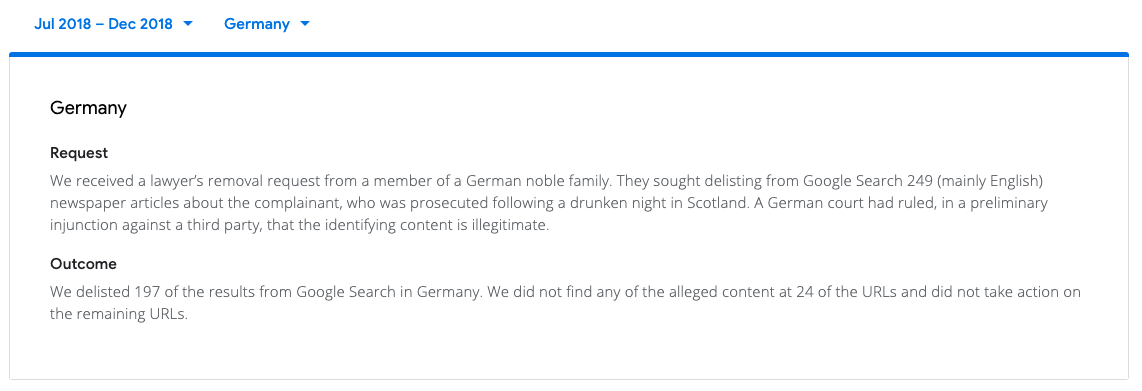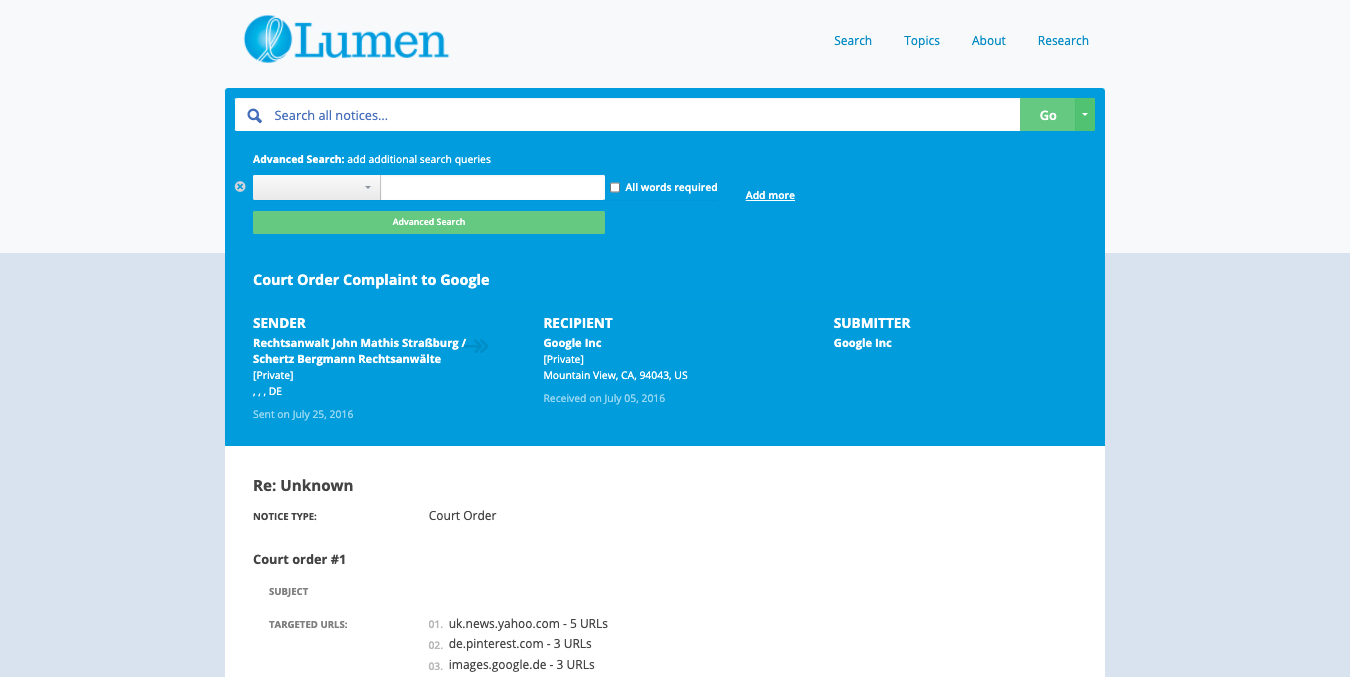In 2014, German princess Theodora Sayn-Wittgenstein, 27 at the time, attended the University of St Andrews’ charity Oktoberfest, got drunk, assaulted police officers and first responders, and said: "I was doing my nails this morning and wondered how many Muslims I could kill." Her family, with the help of Google and Europe’s right to be forgotten law, have been trying to make that night disappear.
Twice a year, Google shares data about how governments and corporations make requests to the company in its Transparency Report. One section of the report broadly summarizes content removal requests to “inform discussions about online content regulation.”
Though the information in this section is nonspecific, the tech company counterintuitively offers details of delisted content. These “requests that may be of public interest” essentially immortalize a selection of material removed by Google over the last decade.
For Germany, one entry jumps out, identifying “a lawyer’s removal request from a member of a German noble family,” who was “prosecuted following a drunken night out in Scotland.”
The outcome of the complaint was the removal of 197 links from Google search in Germany following a “preliminary injunction against a third party that the identifying content is illegitimate.”

Local news outlets also reported that Sayn-Wittgenstein stripped, made homophobic comments to security staff, and called Scottish officers pedophiles at the police station.
The right to be forgotten was intended to allow people to control personal and private information about themselves remaining online. It makes specific exceptions for information in the public interest, but has been used by elites with the means to take cases to court to protect the public from knowing about their past misdeeds. Last year, a research paper written by Google staff noted that between 2014 and 2019, “non-government public figures such as celebrities requested the delisting of 74,602 URLs and politicians and government officials another 65,933 URLs.”
Sayn-Wittgenstein initially denied the incident, later admitting to it in court. She pleaded guilty to four charges, including assault to injury and breach of the peace. One charge was admonished and she was fined £1,000 for the other three.
The princess’ lawyer said she "brought shame on herself and her family," adding, "her behavior was totally out of character.”
A German law firm, Schertz Bergmann, sought delisting 249 newspaper articles on Google, citing a preliminary injunction sought against a third party. In its Transparency Report, Google confirmed the delisting of 197 links after a German court deemed the reporting “illegitimate.”
Google refused to share further details of the request, or the reason behind the decision to delist the articles. We’ve been unable to obtain a copy of the injunction.
As a result of the delisting, searching “Theodora Sayn-Wittgenstein” outside of Germany shows both results about the princess’s 2018 wedding and articles relating to the drunken outburst. Within the country, the same search almost exclusively returns results about her marriage. Google alludes to the removal at the bottom of the page.

Clicking “read more about the request” redirects you to an archive of 84 URLs from news sites, blogs and message boards referring to the incident. Providing an email address allows a user to request full access to all of the links. Not listed are articles from major news outlets in the UK appearing on the first page of Google outside of Germany, but only on the fourth and fifth pages within the country.


When asked if the removal amounts to suppression of free press, a spokesperson from Google said: “Since 2014, we’ve worked hard to implement the right to be forgotten in Europe, and to strike a sensible balance between people’s rights of access to information and privacy.” The comment parrots a previous quote given to the BBC after the EU’s highest court ruled that Google doesn’t have to apply the right to be forgotten globally.
At the end of last month, Germany’s top court also ruled, in two separate cases, that the right to information trumps the right to be forgotten. The rulings stated Google does not have to delist factually correct news articles, even if they’re unflattering.
Although Germany is now a federal country, the abolishment of and legal privileges of nobility in 1919 caused a new class of wealthy commoners to emerge. Titles remained, and so did financial assets not available to the rest of us.
The removal of results about Sayn-Wittgenstein set a precedent suggesting the rich and powerful have more of a right to be forgotten than the average person—or at least the ability to see it enforced.
What transpires is the question of how people can be legally forgotten. While the right of erasure has existed in European data laws since 1995, there’s been a constant legal struggle between privacy rights and free press.
The right to be forgotten has existed in draft regulation as early as 2012, and has since been incorporated into Article 17 of the General Data Protection Regulation (GDPR) in the EU. In this regulation, it is defined as an “obligation to erase personal data.”
In practice, however, being forgotten only applies on a case-by-case basis.
“The exact contours change with each court ruling, and vary with specific jurisdictional contexts,” said Viktor Mayer-Schönberger, Professor of Internet Governance and Regulation at the Oxford Internet Institute.
In the context of GDPR, "exercising the right of freedom of expression and information" is protected. Therefore, public interest trumps personal privacy.
“In the jurisdictions that I am aware of, it was always clear that media would be exempt,” Mayer-Schönberger said.
In his book, Delete: The Virtue of Forgetting in the Digital Age, Mayer-Schönberger describes the dangers of information staying online forever. Though he believes that some information shouldn’t always remain online, he says this doesn’t mean it shouldn’t be archived.
“Forgetting is never absolute, always relative,” he said, “The Guardian, for example, never erases from its archives, but when you access back issues via the internet, they sometimes blank out names. When you actually go to the Guardian archives and check the database there, of course, all remains unredacted.”
Theodora Sayn-Wittgenstein has been contacted via her estate but didn’t respond.
from VICE US https://ift.tt/3apsq0b
via cheap web hosting
No comments:
Post a Comment